Organisational Behaviour Report: BBC Case Study on Leadership & Teams
VerifiedAdded on 2020/12/30
|20
|4906
|193
Report
AI Summary
This report provides an in-depth analysis of organisational behaviour within the British Broadcasting Company (BBC). It examines the impact of organisational behaviour on the company's culture, power dynamics, and the political behaviour of managers. The report explores various motivational theories, including content and process theories, to understand how BBC motivates its employees. It also delves into different types of teams and models of team development, highlighting their benefits. Furthermore, the report discusses organisational philosophies and concepts, such as the Path Goal Theory, and identifies barriers to effective performance. The analysis covers topics like power culture, reward power, and the application of Hofstede's cultural dimensions. The report emphasizes the importance of treating employees equally and fostering a positive work environment to enhance productivity and achieve organisational goals. It provides a comprehensive overview of how BBC manages its organisational behaviour to improve employee performance and overall organisational success.
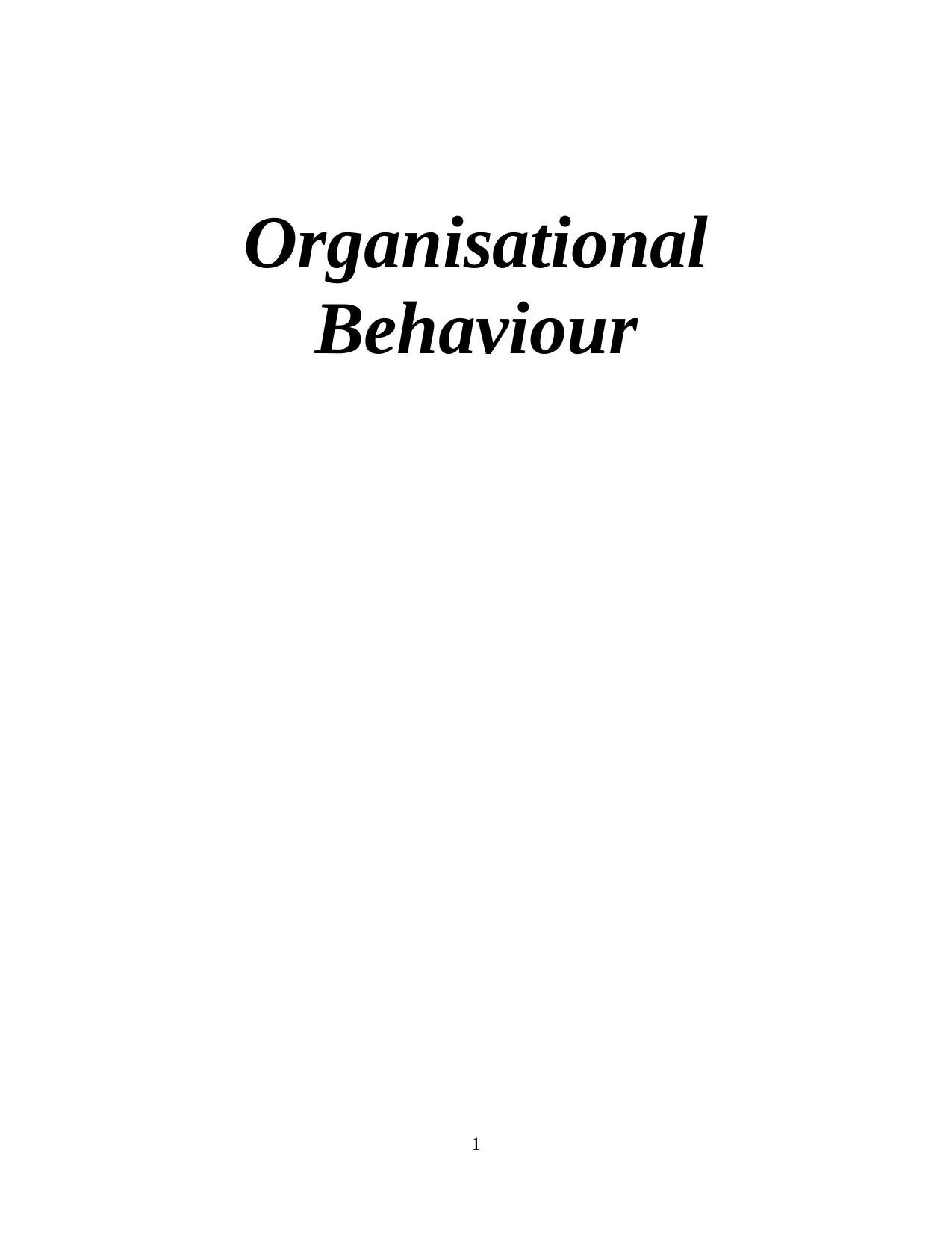
Organisational
Behaviour
1
Behaviour
1
Paraphrase This Document
Need a fresh take? Get an instant paraphrase of this document with our AI Paraphraser
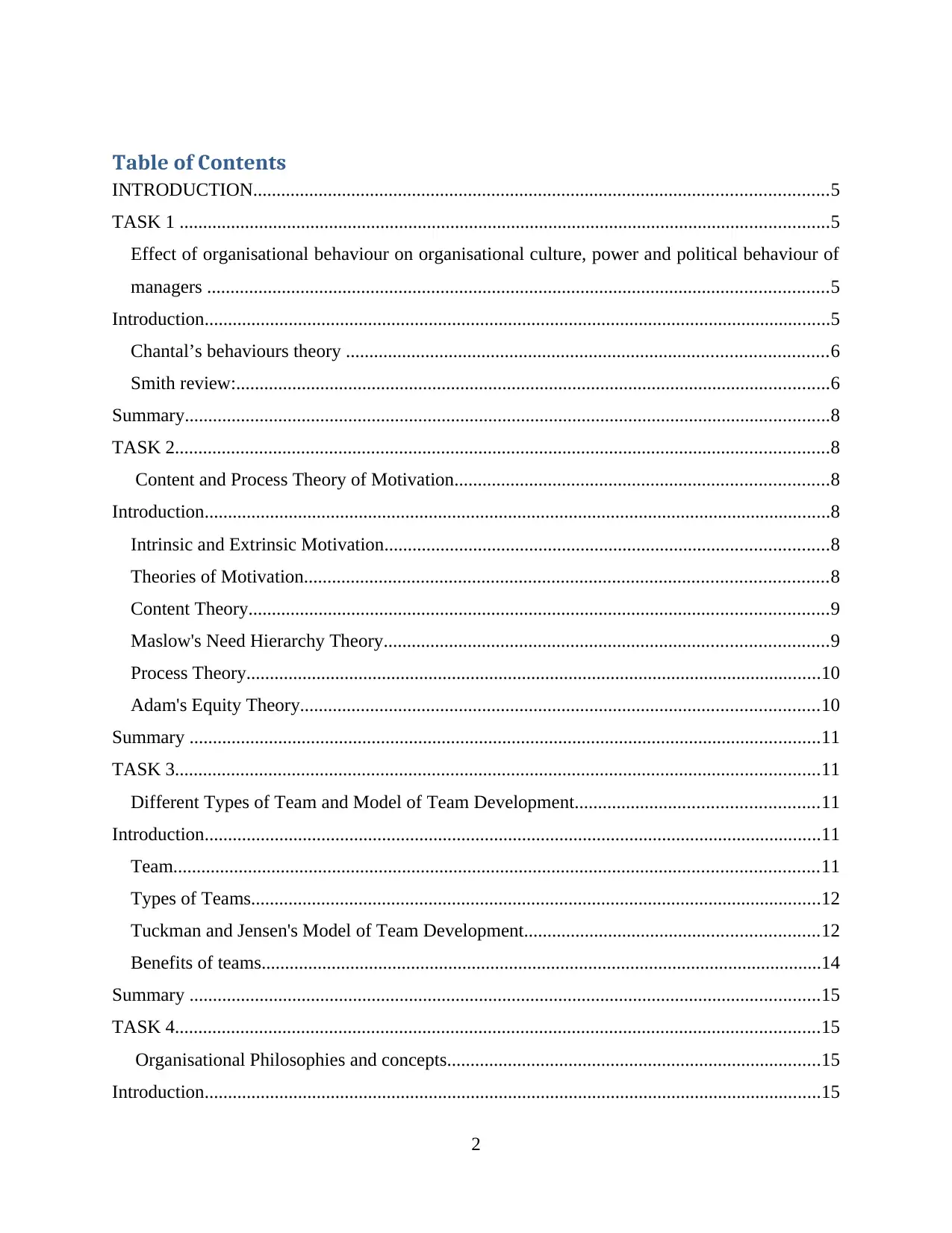
Table of Contents
INTRODUCTION...........................................................................................................................5
TASK 1 ...........................................................................................................................................5
Effect of organisational behaviour on organisational culture, power and political behaviour of
managers .....................................................................................................................................5
Introduction......................................................................................................................................5
Chantal’s behaviours theory .......................................................................................................6
Smith review:...............................................................................................................................6
Summary..........................................................................................................................................8
TASK 2............................................................................................................................................8
Content and Process Theory of Motivation................................................................................8
Introduction......................................................................................................................................8
Intrinsic and Extrinsic Motivation...............................................................................................8
Theories of Motivation................................................................................................................8
Content Theory............................................................................................................................9
Maslow's Need Hierarchy Theory...............................................................................................9
Process Theory...........................................................................................................................10
Adam's Equity Theory...............................................................................................................10
Summary .......................................................................................................................................11
TASK 3..........................................................................................................................................11
Different Types of Team and Model of Team Development....................................................11
Introduction....................................................................................................................................11
Team..........................................................................................................................................11
Types of Teams..........................................................................................................................12
Tuckman and Jensen's Model of Team Development...............................................................12
Benefits of teams........................................................................................................................14
Summary .......................................................................................................................................15
TASK 4..........................................................................................................................................15
Organisational Philosophies and concepts................................................................................15
Introduction....................................................................................................................................15
2
INTRODUCTION...........................................................................................................................5
TASK 1 ...........................................................................................................................................5
Effect of organisational behaviour on organisational culture, power and political behaviour of
managers .....................................................................................................................................5
Introduction......................................................................................................................................5
Chantal’s behaviours theory .......................................................................................................6
Smith review:...............................................................................................................................6
Summary..........................................................................................................................................8
TASK 2............................................................................................................................................8
Content and Process Theory of Motivation................................................................................8
Introduction......................................................................................................................................8
Intrinsic and Extrinsic Motivation...............................................................................................8
Theories of Motivation................................................................................................................8
Content Theory............................................................................................................................9
Maslow's Need Hierarchy Theory...............................................................................................9
Process Theory...........................................................................................................................10
Adam's Equity Theory...............................................................................................................10
Summary .......................................................................................................................................11
TASK 3..........................................................................................................................................11
Different Types of Team and Model of Team Development....................................................11
Introduction....................................................................................................................................11
Team..........................................................................................................................................11
Types of Teams..........................................................................................................................12
Tuckman and Jensen's Model of Team Development...............................................................12
Benefits of teams........................................................................................................................14
Summary .......................................................................................................................................15
TASK 4..........................................................................................................................................15
Organisational Philosophies and concepts................................................................................15
Introduction....................................................................................................................................15
2
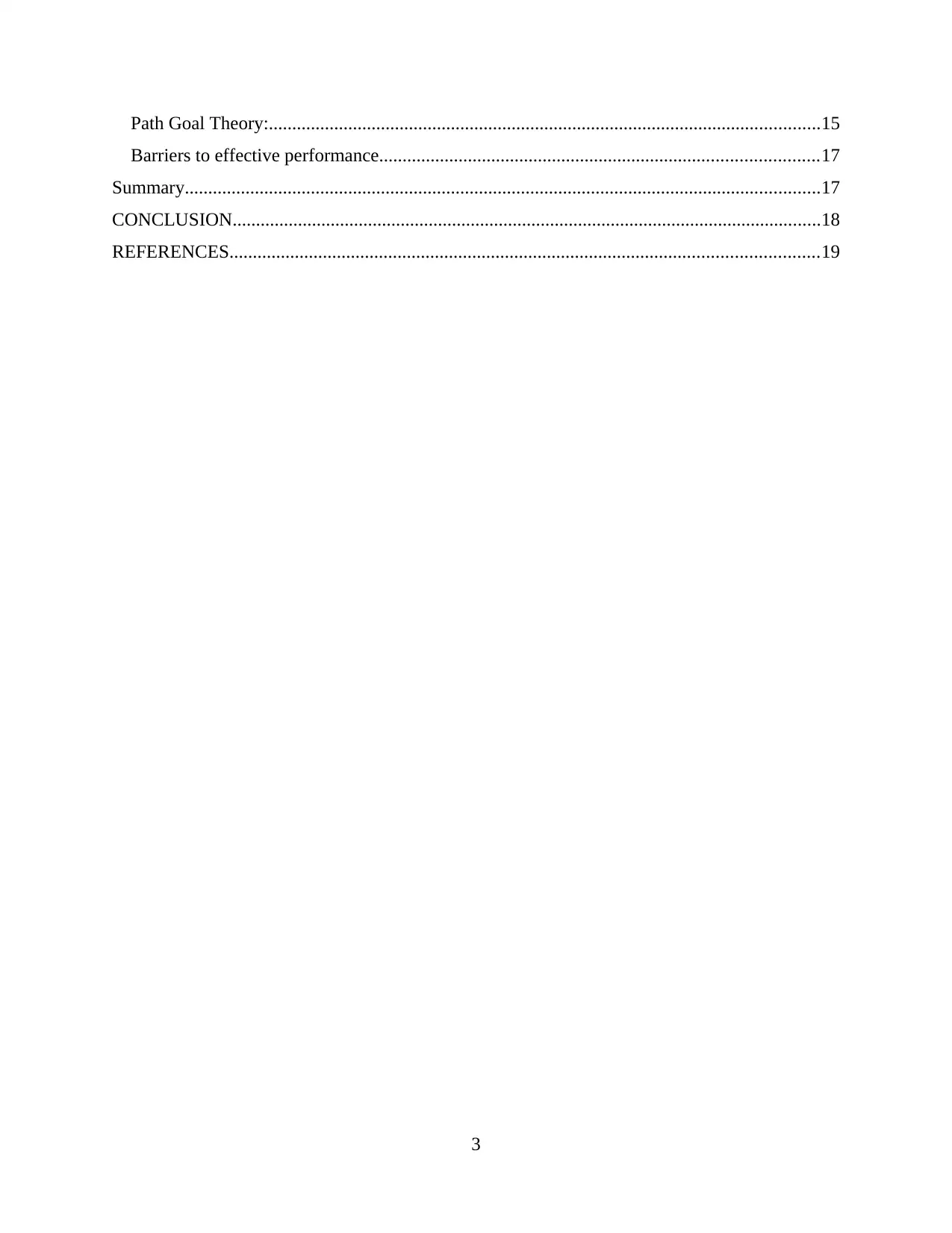
Path Goal Theory:......................................................................................................................15
Barriers to effective performance..............................................................................................17
Summary........................................................................................................................................17
CONCLUSION..............................................................................................................................18
REFERENCES..............................................................................................................................19
3
Barriers to effective performance..............................................................................................17
Summary........................................................................................................................................17
CONCLUSION..............................................................................................................................18
REFERENCES..............................................................................................................................19
3
⊘ This is a preview!⊘
Do you want full access?
Subscribe today to unlock all pages.

Trusted by 1+ million students worldwide
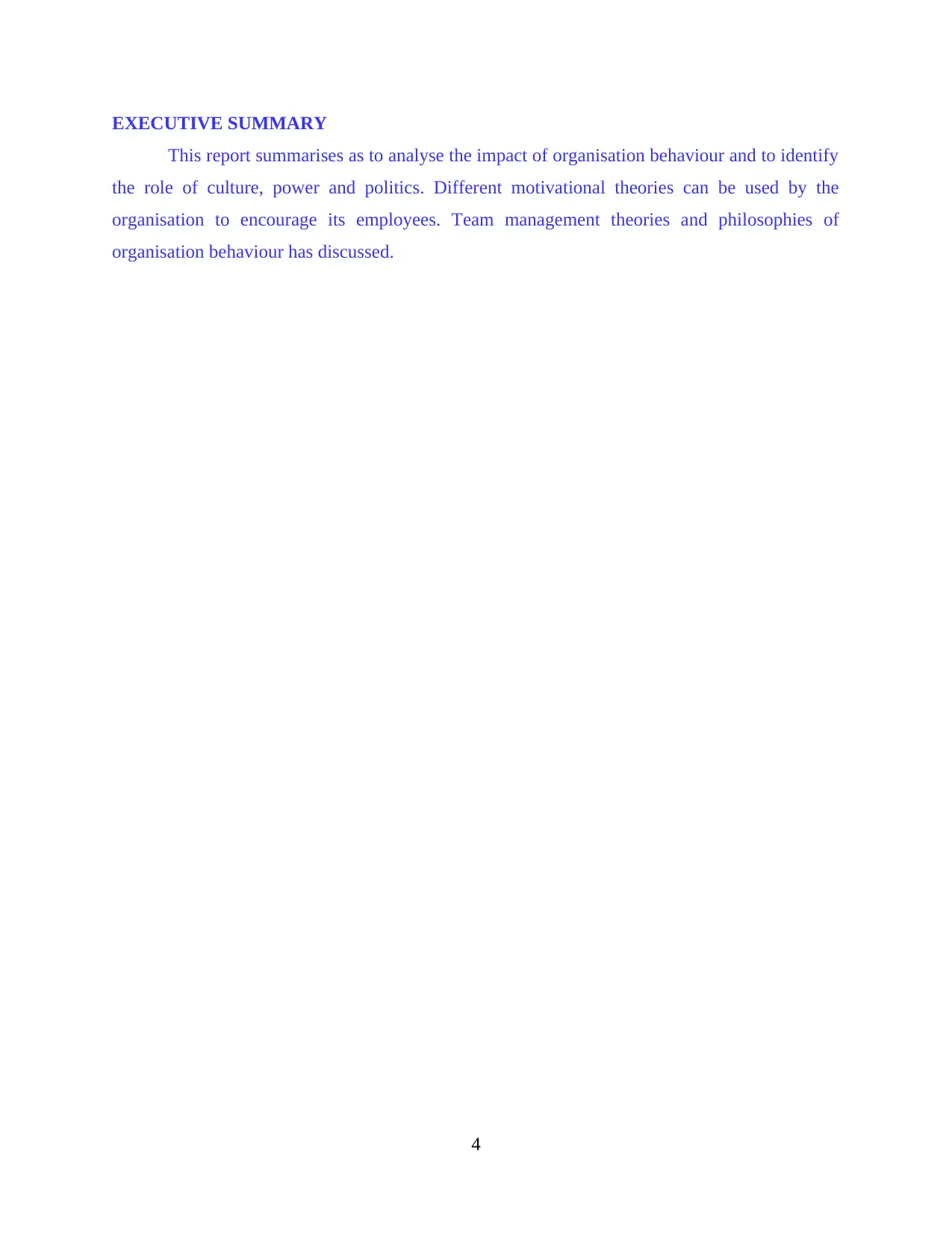
EXECUTIVE SUMMARY
This report summarises as to analyse the impact of organisation behaviour and to identify
the role of culture, power and politics. Different motivational theories can be used by the
organisation to encourage its employees. Team management theories and philosophies of
organisation behaviour has discussed.
4
This report summarises as to analyse the impact of organisation behaviour and to identify
the role of culture, power and politics. Different motivational theories can be used by the
organisation to encourage its employees. Team management theories and philosophies of
organisation behaviour has discussed.
4
Paraphrase This Document
Need a fresh take? Get an instant paraphrase of this document with our AI Paraphraser
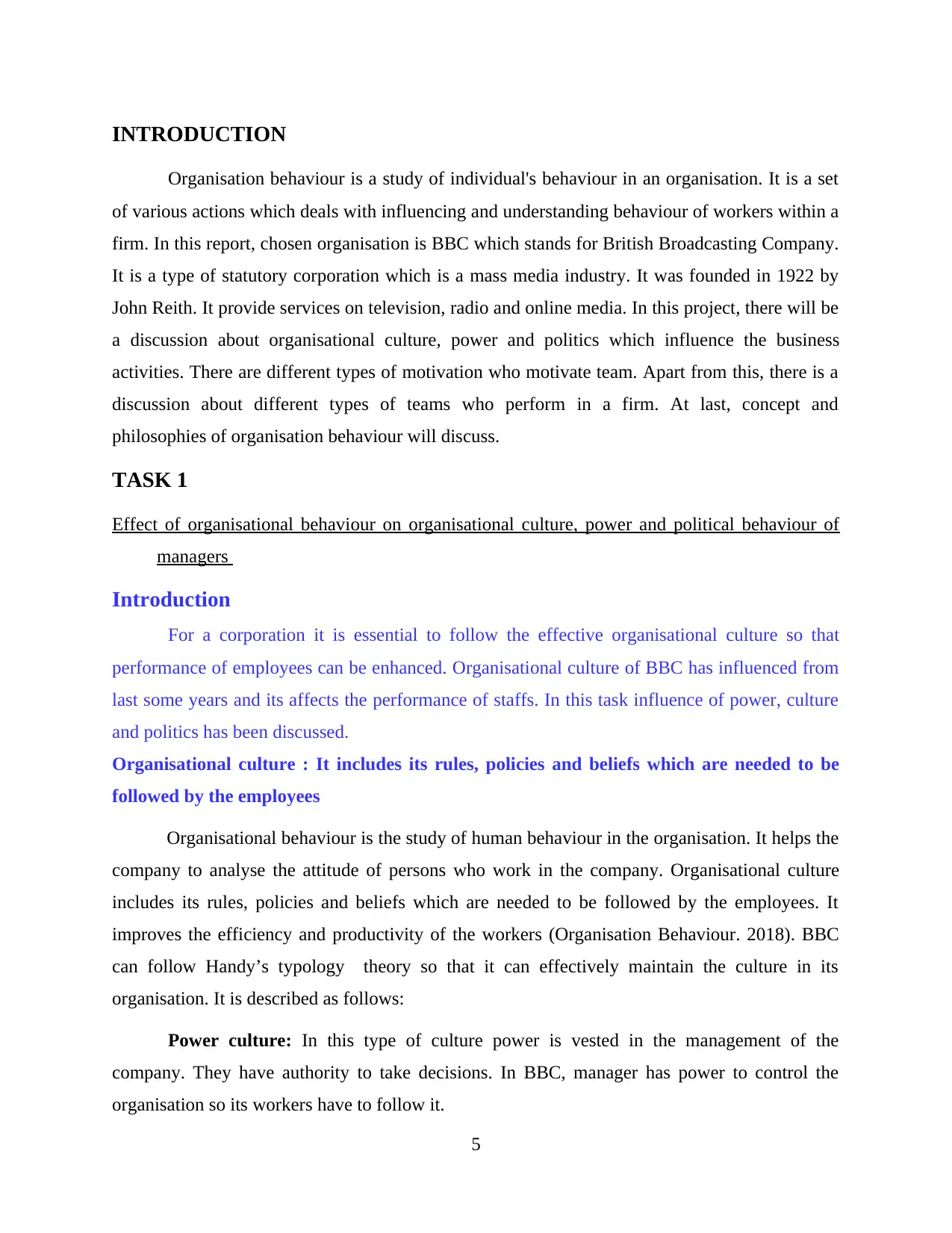
INTRODUCTION
Organisation behaviour is a study of individual's behaviour in an organisation. It is a set
of various actions which deals with influencing and understanding behaviour of workers within a
firm. In this report, chosen organisation is BBC which stands for British Broadcasting Company.
It is a type of statutory corporation which is a mass media industry. It was founded in 1922 by
John Reith. It provide services on television, radio and online media. In this project, there will be
a discussion about organisational culture, power and politics which influence the business
activities. There are different types of motivation who motivate team. Apart from this, there is a
discussion about different types of teams who perform in a firm. At last, concept and
philosophies of organisation behaviour will discuss.
TASK 1
Effect of organisational behaviour on organisational culture, power and political behaviour of
managers
Introduction
For a corporation it is essential to follow the effective organisational culture so that
performance of employees can be enhanced. Organisational culture of BBC has influenced from
last some years and its affects the performance of staffs. In this task influence of power, culture
and politics has been discussed.
Organisational culture : It includes its rules, policies and beliefs which are needed to be
followed by the employees
Organisational behaviour is the study of human behaviour in the organisation. It helps the
company to analyse the attitude of persons who work in the company. Organisational culture
includes its rules, policies and beliefs which are needed to be followed by the employees. It
improves the efficiency and productivity of the workers (Organisation Behaviour. 2018). BBC
can follow Handy’s typology theory so that it can effectively maintain the culture in its
organisation. It is described as follows:
Power culture: In this type of culture power is vested in the management of the
company. They have authority to take decisions. In BBC, manager has power to control the
organisation so its workers have to follow it.
5
Organisation behaviour is a study of individual's behaviour in an organisation. It is a set
of various actions which deals with influencing and understanding behaviour of workers within a
firm. In this report, chosen organisation is BBC which stands for British Broadcasting Company.
It is a type of statutory corporation which is a mass media industry. It was founded in 1922 by
John Reith. It provide services on television, radio and online media. In this project, there will be
a discussion about organisational culture, power and politics which influence the business
activities. There are different types of motivation who motivate team. Apart from this, there is a
discussion about different types of teams who perform in a firm. At last, concept and
philosophies of organisation behaviour will discuss.
TASK 1
Effect of organisational behaviour on organisational culture, power and political behaviour of
managers
Introduction
For a corporation it is essential to follow the effective organisational culture so that
performance of employees can be enhanced. Organisational culture of BBC has influenced from
last some years and its affects the performance of staffs. In this task influence of power, culture
and politics has been discussed.
Organisational culture : It includes its rules, policies and beliefs which are needed to be
followed by the employees
Organisational behaviour is the study of human behaviour in the organisation. It helps the
company to analyse the attitude of persons who work in the company. Organisational culture
includes its rules, policies and beliefs which are needed to be followed by the employees. It
improves the efficiency and productivity of the workers (Organisation Behaviour. 2018). BBC
can follow Handy’s typology theory so that it can effectively maintain the culture in its
organisation. It is described as follows:
Power culture: In this type of culture power is vested in the management of the
company. They have authority to take decisions. In BBC, manager has power to control the
organisation so its workers have to follow it.
5
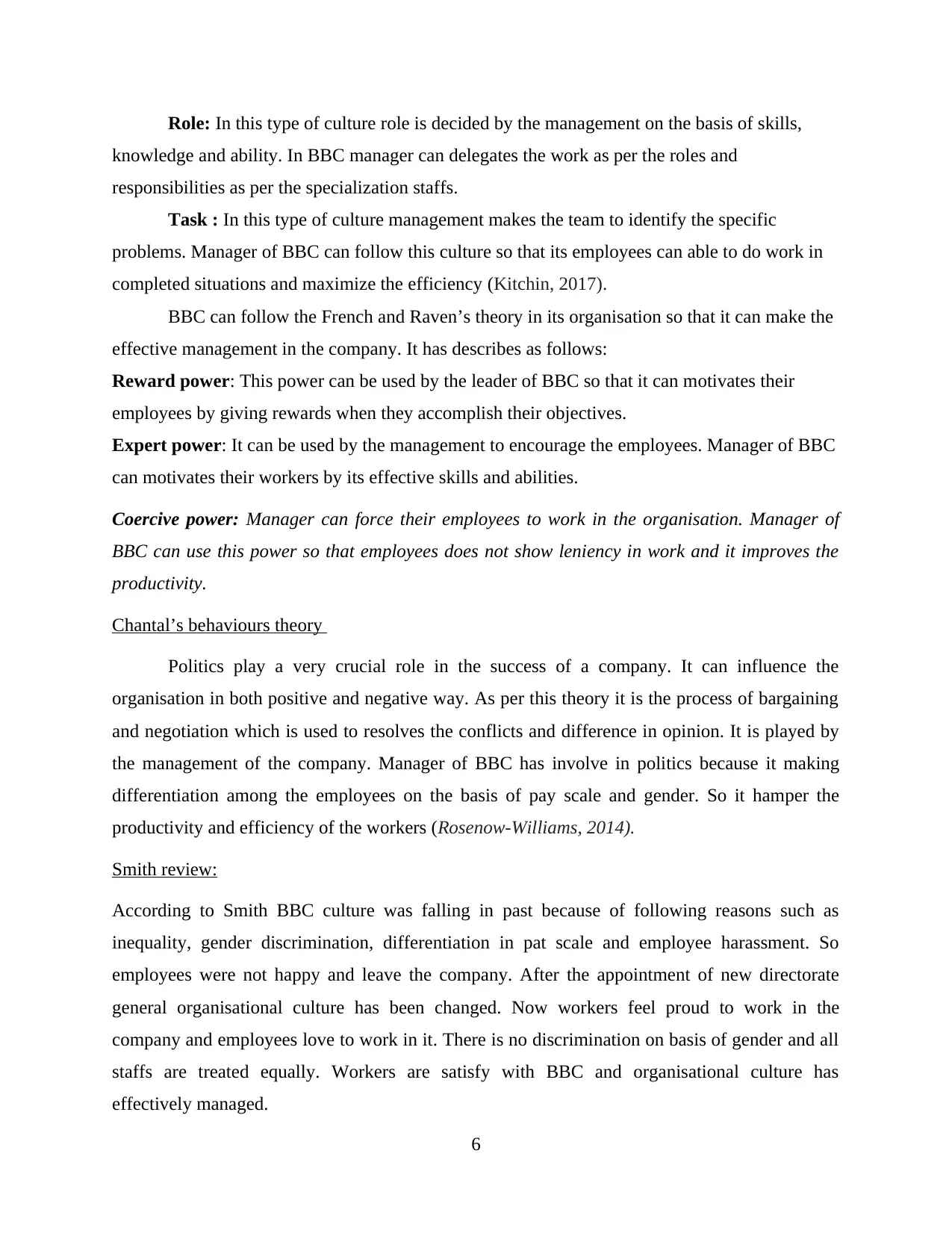
Role: In this type of culture role is decided by the management on the basis of skills,
knowledge and ability. In BBC manager can delegates the work as per the roles and
responsibilities as per the specialization staffs.
Task : In this type of culture management makes the team to identify the specific
problems. Manager of BBC can follow this culture so that its employees can able to do work in
completed situations and maximize the efficiency (Kitchin, 2017).
BBC can follow the French and Raven’s theory in its organisation so that it can make the
effective management in the company. It has describes as follows:
Reward power: This power can be used by the leader of BBC so that it can motivates their
employees by giving rewards when they accomplish their objectives.
Expert power: It can be used by the management to encourage the employees. Manager of BBC
can motivates their workers by its effective skills and abilities.
Coercive power: Manager can force their employees to work in the organisation. Manager of
BBC can use this power so that employees does not show leniency in work and it improves the
productivity.
Chantal’s behaviours theory
Politics play a very crucial role in the success of a company. It can influence the
organisation in both positive and negative way. As per this theory it is the process of bargaining
and negotiation which is used to resolves the conflicts and difference in opinion. It is played by
the management of the company. Manager of BBC has involve in politics because it making
differentiation among the employees on the basis of pay scale and gender. So it hamper the
productivity and efficiency of the workers (Rosenow-Williams, 2014).
Smith review:
According to Smith BBC culture was falling in past because of following reasons such as
inequality, gender discrimination, differentiation in pat scale and employee harassment. So
employees were not happy and leave the company. After the appointment of new directorate
general organisational culture has been changed. Now workers feel proud to work in the
company and employees love to work in it. There is no discrimination on basis of gender and all
staffs are treated equally. Workers are satisfy with BBC and organisational culture has
effectively managed.
6
knowledge and ability. In BBC manager can delegates the work as per the roles and
responsibilities as per the specialization staffs.
Task : In this type of culture management makes the team to identify the specific
problems. Manager of BBC can follow this culture so that its employees can able to do work in
completed situations and maximize the efficiency (Kitchin, 2017).
BBC can follow the French and Raven’s theory in its organisation so that it can make the
effective management in the company. It has describes as follows:
Reward power: This power can be used by the leader of BBC so that it can motivates their
employees by giving rewards when they accomplish their objectives.
Expert power: It can be used by the management to encourage the employees. Manager of BBC
can motivates their workers by its effective skills and abilities.
Coercive power: Manager can force their employees to work in the organisation. Manager of
BBC can use this power so that employees does not show leniency in work and it improves the
productivity.
Chantal’s behaviours theory
Politics play a very crucial role in the success of a company. It can influence the
organisation in both positive and negative way. As per this theory it is the process of bargaining
and negotiation which is used to resolves the conflicts and difference in opinion. It is played by
the management of the company. Manager of BBC has involve in politics because it making
differentiation among the employees on the basis of pay scale and gender. So it hamper the
productivity and efficiency of the workers (Rosenow-Williams, 2014).
Smith review:
According to Smith BBC culture was falling in past because of following reasons such as
inequality, gender discrimination, differentiation in pat scale and employee harassment. So
employees were not happy and leave the company. After the appointment of new directorate
general organisational culture has been changed. Now workers feel proud to work in the
company and employees love to work in it. There is no discrimination on basis of gender and all
staffs are treated equally. Workers are satisfy with BBC and organisational culture has
effectively managed.
6
⊘ This is a preview!⊘
Do you want full access?
Subscribe today to unlock all pages.

Trusted by 1+ million students worldwide
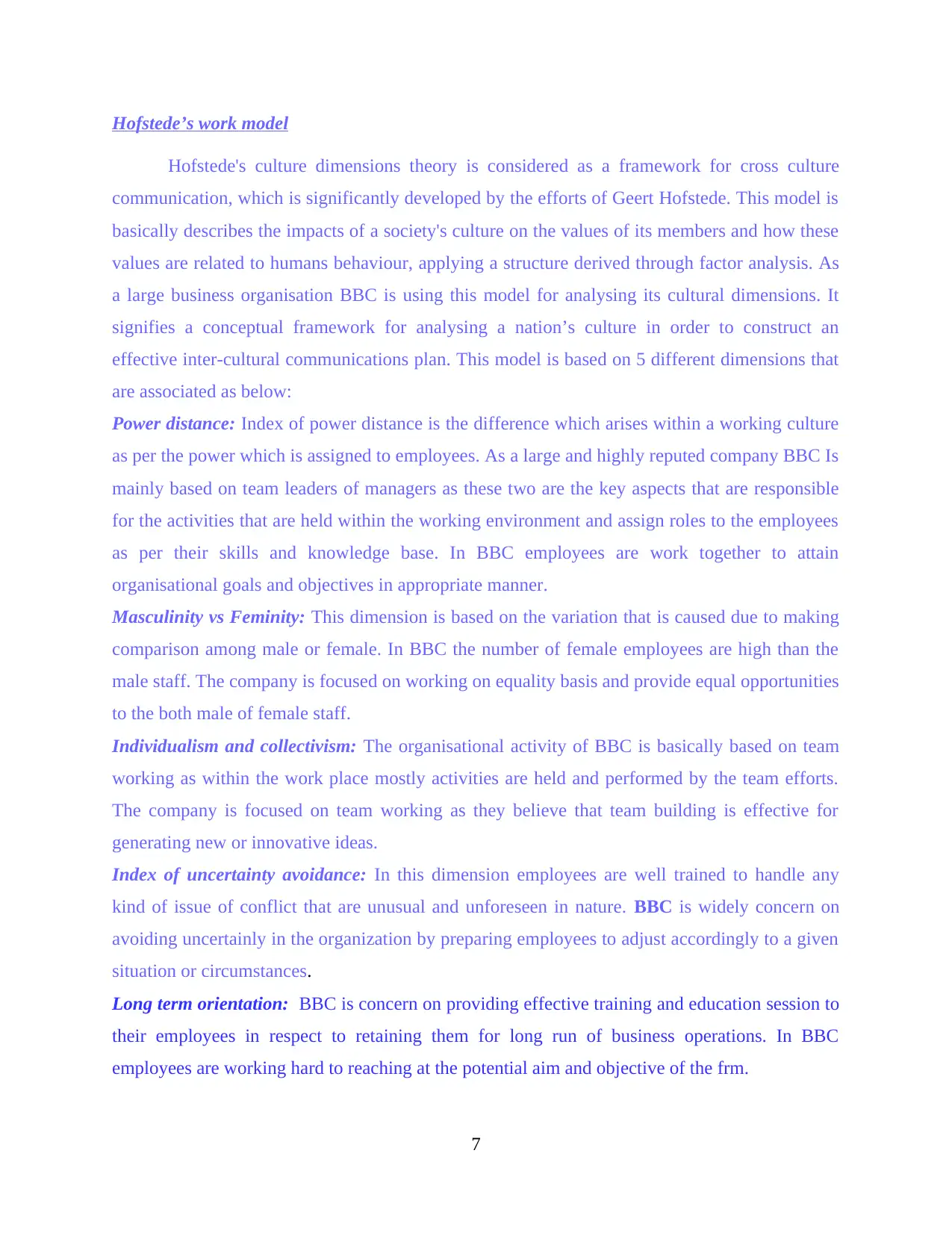
Hofstede’s work model
Hofstede's culture dimensions theory is considered as a framework for cross culture
communication, which is significantly developed by the efforts of Geert Hofstede. This model is
basically describes the impacts of a society's culture on the values of its members and how these
values are related to humans behaviour, applying a structure derived through factor analysis. As
a large business organisation BBC is using this model for analysing its cultural dimensions. It
signifies a conceptual framework for analysing a nation’s culture in order to construct an
effective inter-cultural communications plan. This model is based on 5 different dimensions that
are associated as below:
Power distance: Index of power distance is the difference which arises within a working culture
as per the power which is assigned to employees. As a large and highly reputed company BBC Is
mainly based on team leaders of managers as these two are the key aspects that are responsible
for the activities that are held within the working environment and assign roles to the employees
as per their skills and knowledge base. In BBC employees are work together to attain
organisational goals and objectives in appropriate manner.
Masculinity vs Feminity: This dimension is based on the variation that is caused due to making
comparison among male or female. In BBC the number of female employees are high than the
male staff. The company is focused on working on equality basis and provide equal opportunities
to the both male of female staff.
Individualism and collectivism: The organisational activity of BBC is basically based on team
working as within the work place mostly activities are held and performed by the team efforts.
The company is focused on team working as they believe that team building is effective for
generating new or innovative ideas.
Index of uncertainty avoidance: In this dimension employees are well trained to handle any
kind of issue of conflict that are unusual and unforeseen in nature. BBC is widely concern on
avoiding uncertainly in the organization by preparing employees to adjust accordingly to a given
situation or circumstances.
Long term orientation: BBC is concern on providing effective training and education session to
their employees in respect to retaining them for long run of business operations. In BBC
employees are working hard to reaching at the potential aim and objective of the frm.
7
Hofstede's culture dimensions theory is considered as a framework for cross culture
communication, which is significantly developed by the efforts of Geert Hofstede. This model is
basically describes the impacts of a society's culture on the values of its members and how these
values are related to humans behaviour, applying a structure derived through factor analysis. As
a large business organisation BBC is using this model for analysing its cultural dimensions. It
signifies a conceptual framework for analysing a nation’s culture in order to construct an
effective inter-cultural communications plan. This model is based on 5 different dimensions that
are associated as below:
Power distance: Index of power distance is the difference which arises within a working culture
as per the power which is assigned to employees. As a large and highly reputed company BBC Is
mainly based on team leaders of managers as these two are the key aspects that are responsible
for the activities that are held within the working environment and assign roles to the employees
as per their skills and knowledge base. In BBC employees are work together to attain
organisational goals and objectives in appropriate manner.
Masculinity vs Feminity: This dimension is based on the variation that is caused due to making
comparison among male or female. In BBC the number of female employees are high than the
male staff. The company is focused on working on equality basis and provide equal opportunities
to the both male of female staff.
Individualism and collectivism: The organisational activity of BBC is basically based on team
working as within the work place mostly activities are held and performed by the team efforts.
The company is focused on team working as they believe that team building is effective for
generating new or innovative ideas.
Index of uncertainty avoidance: In this dimension employees are well trained to handle any
kind of issue of conflict that are unusual and unforeseen in nature. BBC is widely concern on
avoiding uncertainly in the organization by preparing employees to adjust accordingly to a given
situation or circumstances.
Long term orientation: BBC is concern on providing effective training and education session to
their employees in respect to retaining them for long run of business operations. In BBC
employees are working hard to reaching at the potential aim and objective of the frm.
7
Paraphrase This Document
Need a fresh take? Get an instant paraphrase of this document with our AI Paraphraser
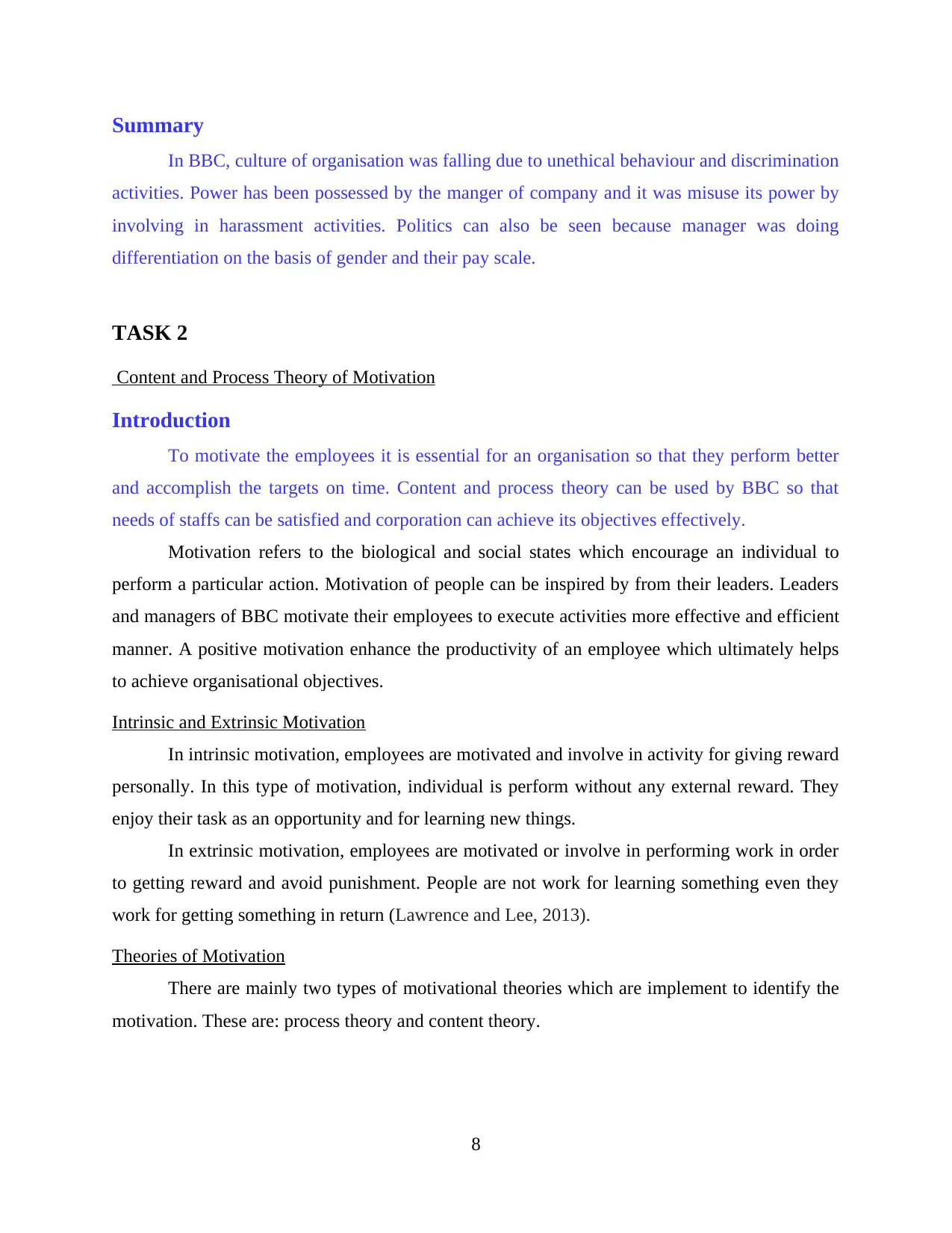
Summary
In BBC, culture of organisation was falling due to unethical behaviour and discrimination
activities. Power has been possessed by the manger of company and it was misuse its power by
involving in harassment activities. Politics can also be seen because manager was doing
differentiation on the basis of gender and their pay scale.
TASK 2
Content and Process Theory of Motivation
Introduction
To motivate the employees it is essential for an organisation so that they perform better
and accomplish the targets on time. Content and process theory can be used by BBC so that
needs of staffs can be satisfied and corporation can achieve its objectives effectively.
Motivation refers to the biological and social states which encourage an individual to
perform a particular action. Motivation of people can be inspired by from their leaders. Leaders
and managers of BBC motivate their employees to execute activities more effective and efficient
manner. A positive motivation enhance the productivity of an employee which ultimately helps
to achieve organisational objectives.
Intrinsic and Extrinsic Motivation
In intrinsic motivation, employees are motivated and involve in activity for giving reward
personally. In this type of motivation, individual is perform without any external reward. They
enjoy their task as an opportunity and for learning new things.
In extrinsic motivation, employees are motivated or involve in performing work in order
to getting reward and avoid punishment. People are not work for learning something even they
work for getting something in return (Lawrence and Lee, 2013).
Theories of Motivation
There are mainly two types of motivational theories which are implement to identify the
motivation. These are: process theory and content theory.
8
In BBC, culture of organisation was falling due to unethical behaviour and discrimination
activities. Power has been possessed by the manger of company and it was misuse its power by
involving in harassment activities. Politics can also be seen because manager was doing
differentiation on the basis of gender and their pay scale.
TASK 2
Content and Process Theory of Motivation
Introduction
To motivate the employees it is essential for an organisation so that they perform better
and accomplish the targets on time. Content and process theory can be used by BBC so that
needs of staffs can be satisfied and corporation can achieve its objectives effectively.
Motivation refers to the biological and social states which encourage an individual to
perform a particular action. Motivation of people can be inspired by from their leaders. Leaders
and managers of BBC motivate their employees to execute activities more effective and efficient
manner. A positive motivation enhance the productivity of an employee which ultimately helps
to achieve organisational objectives.
Intrinsic and Extrinsic Motivation
In intrinsic motivation, employees are motivated and involve in activity for giving reward
personally. In this type of motivation, individual is perform without any external reward. They
enjoy their task as an opportunity and for learning new things.
In extrinsic motivation, employees are motivated or involve in performing work in order
to getting reward and avoid punishment. People are not work for learning something even they
work for getting something in return (Lawrence and Lee, 2013).
Theories of Motivation
There are mainly two types of motivational theories which are implement to identify the
motivation. These are: process theory and content theory.
8
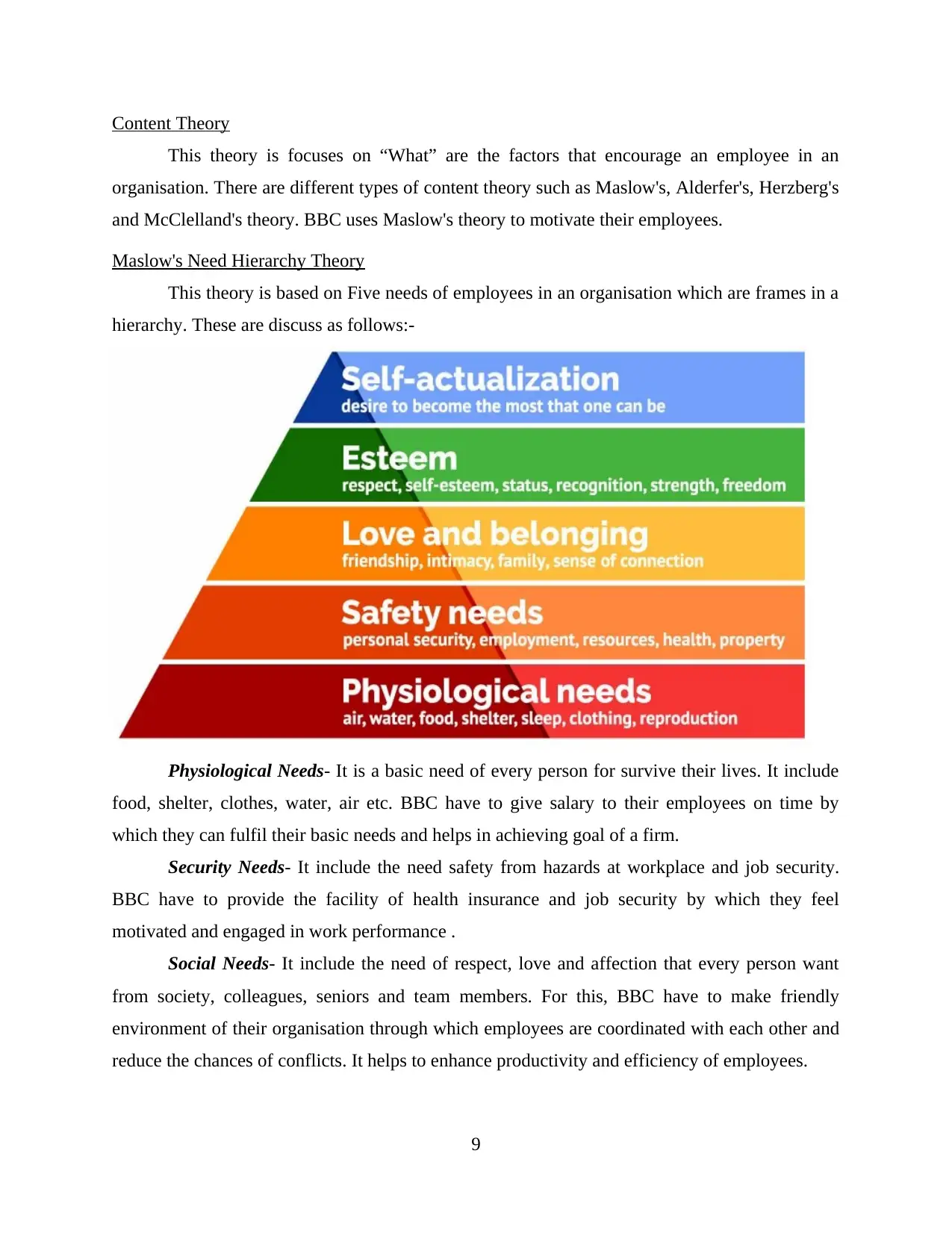
Content Theory
This theory is focuses on “What” are the factors that encourage an employee in an
organisation. There are different types of content theory such as Maslow's, Alderfer's, Herzberg's
and McClelland's theory. BBC uses Maslow's theory to motivate their employees.
Maslow's Need Hierarchy Theory
This theory is based on Five needs of employees in an organisation which are frames in a
hierarchy. These are discuss as follows:-
Physiological Needs- It is a basic need of every person for survive their lives. It include
food, shelter, clothes, water, air etc. BBC have to give salary to their employees on time by
which they can fulfil their basic needs and helps in achieving goal of a firm.
Security Needs- It include the need safety from hazards at workplace and job security.
BBC have to provide the facility of health insurance and job security by which they feel
motivated and engaged in work performance .
Social Needs- It include the need of respect, love and affection that every person want
from society, colleagues, seniors and team members. For this, BBC have to make friendly
environment of their organisation through which employees are coordinated with each other and
reduce the chances of conflicts. It helps to enhance productivity and efficiency of employees.
9
This theory is focuses on “What” are the factors that encourage an employee in an
organisation. There are different types of content theory such as Maslow's, Alderfer's, Herzberg's
and McClelland's theory. BBC uses Maslow's theory to motivate their employees.
Maslow's Need Hierarchy Theory
This theory is based on Five needs of employees in an organisation which are frames in a
hierarchy. These are discuss as follows:-
Physiological Needs- It is a basic need of every person for survive their lives. It include
food, shelter, clothes, water, air etc. BBC have to give salary to their employees on time by
which they can fulfil their basic needs and helps in achieving goal of a firm.
Security Needs- It include the need safety from hazards at workplace and job security.
BBC have to provide the facility of health insurance and job security by which they feel
motivated and engaged in work performance .
Social Needs- It include the need of respect, love and affection that every person want
from society, colleagues, seniors and team members. For this, BBC have to make friendly
environment of their organisation through which employees are coordinated with each other and
reduce the chances of conflicts. It helps to enhance productivity and efficiency of employees.
9
⊘ This is a preview!⊘
Do you want full access?
Subscribe today to unlock all pages.

Trusted by 1+ million students worldwide
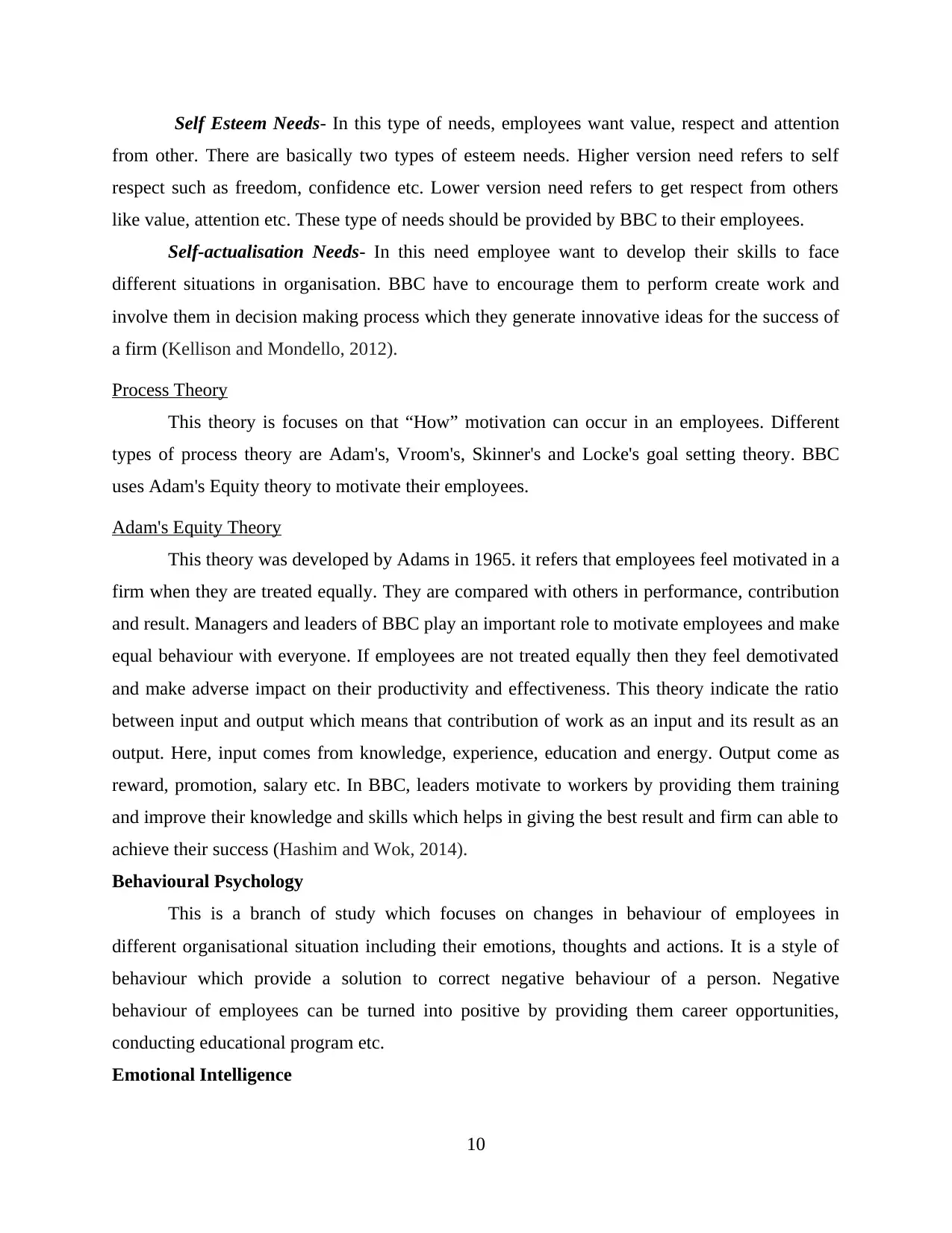
Self Esteem Needs- In this type of needs, employees want value, respect and attention
from other. There are basically two types of esteem needs. Higher version need refers to self
respect such as freedom, confidence etc. Lower version need refers to get respect from others
like value, attention etc. These type of needs should be provided by BBC to their employees.
Self-actualisation Needs- In this need employee want to develop their skills to face
different situations in organisation. BBC have to encourage them to perform create work and
involve them in decision making process which they generate innovative ideas for the success of
a firm (Kellison and Mondello, 2012).
Process Theory
This theory is focuses on that “How” motivation can occur in an employees. Different
types of process theory are Adam's, Vroom's, Skinner's and Locke's goal setting theory. BBC
uses Adam's Equity theory to motivate their employees.
Adam's Equity Theory
This theory was developed by Adams in 1965. it refers that employees feel motivated in a
firm when they are treated equally. They are compared with others in performance, contribution
and result. Managers and leaders of BBC play an important role to motivate employees and make
equal behaviour with everyone. If employees are not treated equally then they feel demotivated
and make adverse impact on their productivity and effectiveness. This theory indicate the ratio
between input and output which means that contribution of work as an input and its result as an
output. Here, input comes from knowledge, experience, education and energy. Output come as
reward, promotion, salary etc. In BBC, leaders motivate to workers by providing them training
and improve their knowledge and skills which helps in giving the best result and firm can able to
achieve their success (Hashim and Wok, 2014).
Behavioural Psychology
This is a branch of study which focuses on changes in behaviour of employees in
different organisational situation including their emotions, thoughts and actions. It is a style of
behaviour which provide a solution to correct negative behaviour of a person. Negative
behaviour of employees can be turned into positive by providing them career opportunities,
conducting educational program etc.
Emotional Intelligence
10
from other. There are basically two types of esteem needs. Higher version need refers to self
respect such as freedom, confidence etc. Lower version need refers to get respect from others
like value, attention etc. These type of needs should be provided by BBC to their employees.
Self-actualisation Needs- In this need employee want to develop their skills to face
different situations in organisation. BBC have to encourage them to perform create work and
involve them in decision making process which they generate innovative ideas for the success of
a firm (Kellison and Mondello, 2012).
Process Theory
This theory is focuses on that “How” motivation can occur in an employees. Different
types of process theory are Adam's, Vroom's, Skinner's and Locke's goal setting theory. BBC
uses Adam's Equity theory to motivate their employees.
Adam's Equity Theory
This theory was developed by Adams in 1965. it refers that employees feel motivated in a
firm when they are treated equally. They are compared with others in performance, contribution
and result. Managers and leaders of BBC play an important role to motivate employees and make
equal behaviour with everyone. If employees are not treated equally then they feel demotivated
and make adverse impact on their productivity and effectiveness. This theory indicate the ratio
between input and output which means that contribution of work as an input and its result as an
output. Here, input comes from knowledge, experience, education and energy. Output come as
reward, promotion, salary etc. In BBC, leaders motivate to workers by providing them training
and improve their knowledge and skills which helps in giving the best result and firm can able to
achieve their success (Hashim and Wok, 2014).
Behavioural Psychology
This is a branch of study which focuses on changes in behaviour of employees in
different organisational situation including their emotions, thoughts and actions. It is a style of
behaviour which provide a solution to correct negative behaviour of a person. Negative
behaviour of employees can be turned into positive by providing them career opportunities,
conducting educational program etc.
Emotional Intelligence
10
Paraphrase This Document
Need a fresh take? Get an instant paraphrase of this document with our AI Paraphraser
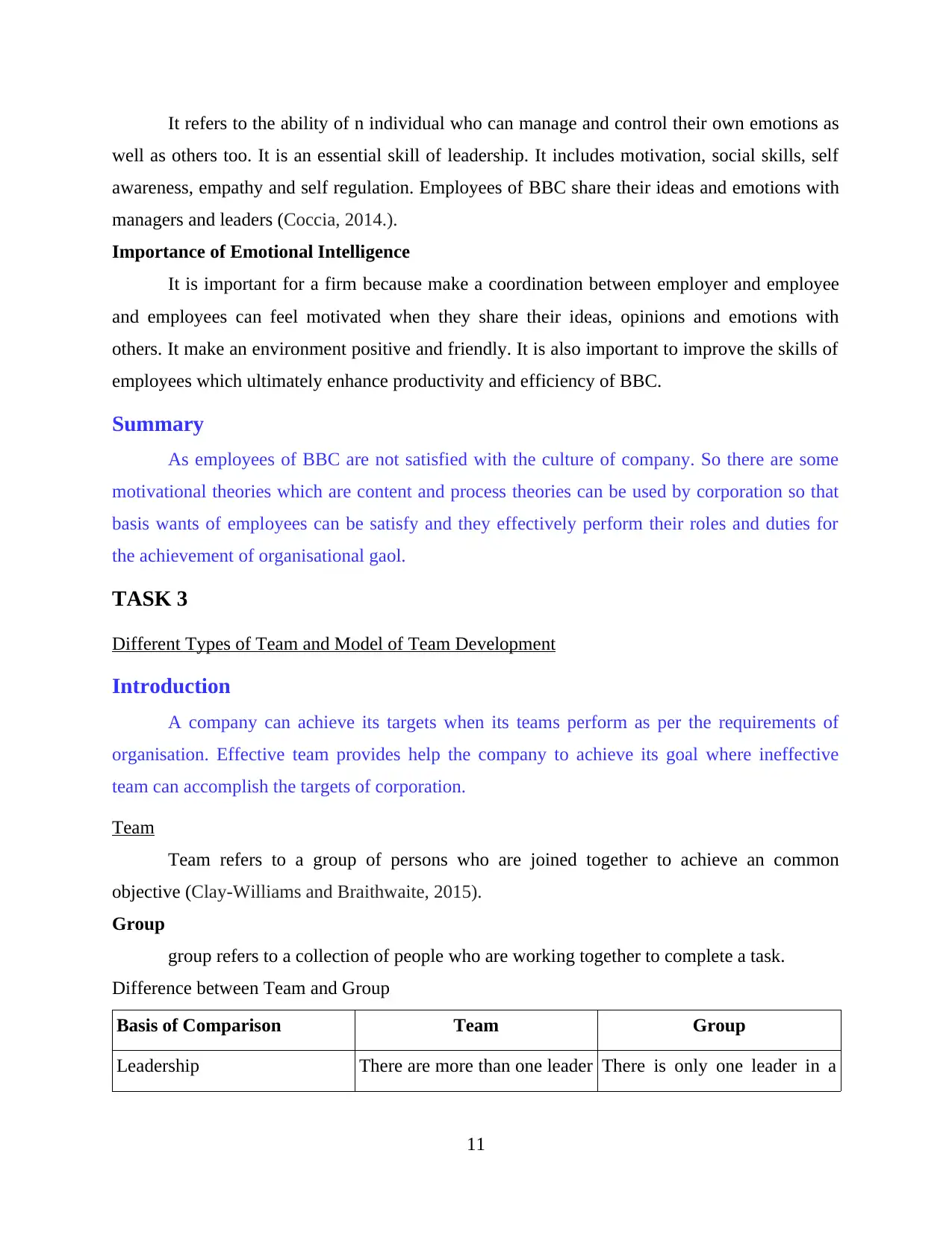
It refers to the ability of n individual who can manage and control their own emotions as
well as others too. It is an essential skill of leadership. It includes motivation, social skills, self
awareness, empathy and self regulation. Employees of BBC share their ideas and emotions with
managers and leaders (Coccia, 2014.).
Importance of Emotional Intelligence
It is important for a firm because make a coordination between employer and employee
and employees can feel motivated when they share their ideas, opinions and emotions with
others. It make an environment positive and friendly. It is also important to improve the skills of
employees which ultimately enhance productivity and efficiency of BBC.
Summary
As employees of BBC are not satisfied with the culture of company. So there are some
motivational theories which are content and process theories can be used by corporation so that
basis wants of employees can be satisfy and they effectively perform their roles and duties for
the achievement of organisational gaol.
TASK 3
Different Types of Team and Model of Team Development
Introduction
A company can achieve its targets when its teams perform as per the requirements of
organisation. Effective team provides help the company to achieve its goal where ineffective
team can accomplish the targets of corporation.
Team
Team refers to a group of persons who are joined together to achieve an common
objective (Clay-Williams and Braithwaite, 2015).
Group
group refers to a collection of people who are working together to complete a task.
Difference between Team and Group
Basis of Comparison Team Group
Leadership There are more than one leader There is only one leader in a
11
well as others too. It is an essential skill of leadership. It includes motivation, social skills, self
awareness, empathy and self regulation. Employees of BBC share their ideas and emotions with
managers and leaders (Coccia, 2014.).
Importance of Emotional Intelligence
It is important for a firm because make a coordination between employer and employee
and employees can feel motivated when they share their ideas, opinions and emotions with
others. It make an environment positive and friendly. It is also important to improve the skills of
employees which ultimately enhance productivity and efficiency of BBC.
Summary
As employees of BBC are not satisfied with the culture of company. So there are some
motivational theories which are content and process theories can be used by corporation so that
basis wants of employees can be satisfy and they effectively perform their roles and duties for
the achievement of organisational gaol.
TASK 3
Different Types of Team and Model of Team Development
Introduction
A company can achieve its targets when its teams perform as per the requirements of
organisation. Effective team provides help the company to achieve its goal where ineffective
team can accomplish the targets of corporation.
Team
Team refers to a group of persons who are joined together to achieve an common
objective (Clay-Williams and Braithwaite, 2015).
Group
group refers to a collection of people who are working together to complete a task.
Difference between Team and Group
Basis of Comparison Team Group
Leadership There are more than one leader There is only one leader in a
11
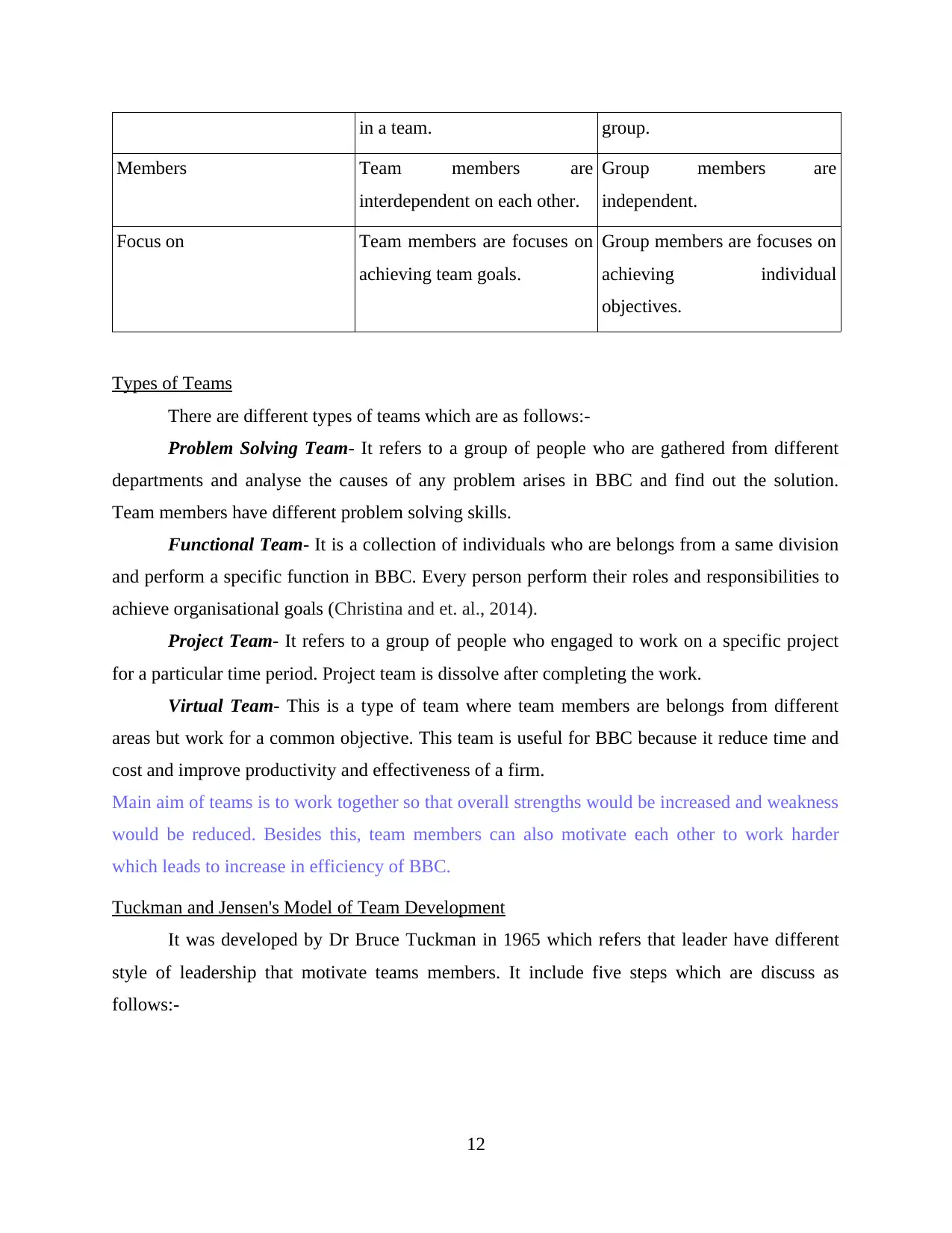
in a team. group.
Members Team members are
interdependent on each other.
Group members are
independent.
Focus on Team members are focuses on
achieving team goals.
Group members are focuses on
achieving individual
objectives.
Types of Teams
There are different types of teams which are as follows:-
Problem Solving Team- It refers to a group of people who are gathered from different
departments and analyse the causes of any problem arises in BBC and find out the solution.
Team members have different problem solving skills.
Functional Team- It is a collection of individuals who are belongs from a same division
and perform a specific function in BBC. Every person perform their roles and responsibilities to
achieve organisational goals (Christina and et. al., 2014).
Project Team- It refers to a group of people who engaged to work on a specific project
for a particular time period. Project team is dissolve after completing the work.
Virtual Team- This is a type of team where team members are belongs from different
areas but work for a common objective. This team is useful for BBC because it reduce time and
cost and improve productivity and effectiveness of a firm.
Main aim of teams is to work together so that overall strengths would be increased and weakness
would be reduced. Besides this, team members can also motivate each other to work harder
which leads to increase in efficiency of BBC.
Tuckman and Jensen's Model of Team Development
It was developed by Dr Bruce Tuckman in 1965 which refers that leader have different
style of leadership that motivate teams members. It include five steps which are discuss as
follows:-
12
Members Team members are
interdependent on each other.
Group members are
independent.
Focus on Team members are focuses on
achieving team goals.
Group members are focuses on
achieving individual
objectives.
Types of Teams
There are different types of teams which are as follows:-
Problem Solving Team- It refers to a group of people who are gathered from different
departments and analyse the causes of any problem arises in BBC and find out the solution.
Team members have different problem solving skills.
Functional Team- It is a collection of individuals who are belongs from a same division
and perform a specific function in BBC. Every person perform their roles and responsibilities to
achieve organisational goals (Christina and et. al., 2014).
Project Team- It refers to a group of people who engaged to work on a specific project
for a particular time period. Project team is dissolve after completing the work.
Virtual Team- This is a type of team where team members are belongs from different
areas but work for a common objective. This team is useful for BBC because it reduce time and
cost and improve productivity and effectiveness of a firm.
Main aim of teams is to work together so that overall strengths would be increased and weakness
would be reduced. Besides this, team members can also motivate each other to work harder
which leads to increase in efficiency of BBC.
Tuckman and Jensen's Model of Team Development
It was developed by Dr Bruce Tuckman in 1965 which refers that leader have different
style of leadership that motivate teams members. It include five steps which are discuss as
follows:-
12
⊘ This is a preview!⊘
Do you want full access?
Subscribe today to unlock all pages.

Trusted by 1+ million students worldwide
1 out of 20
Related Documents
Your All-in-One AI-Powered Toolkit for Academic Success.
+13062052269
info@desklib.com
Available 24*7 on WhatsApp / Email
![[object Object]](/_next/static/media/star-bottom.7253800d.svg)
Unlock your academic potential
Copyright © 2020–2025 A2Z Services. All Rights Reserved. Developed and managed by ZUCOL.





